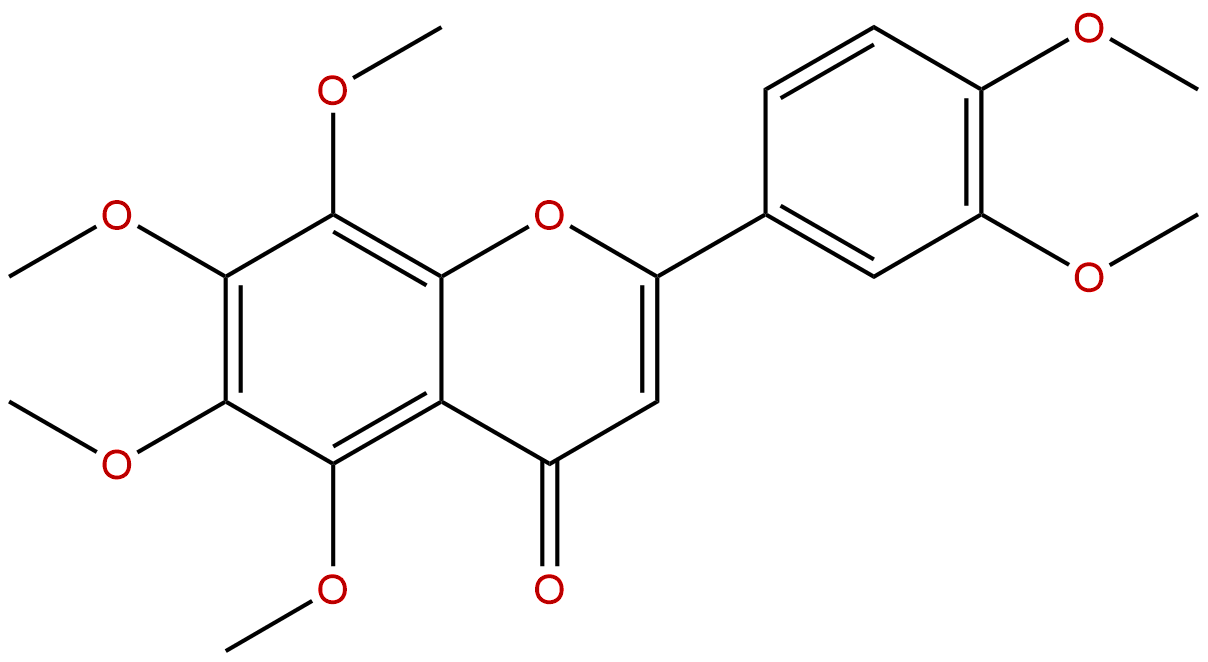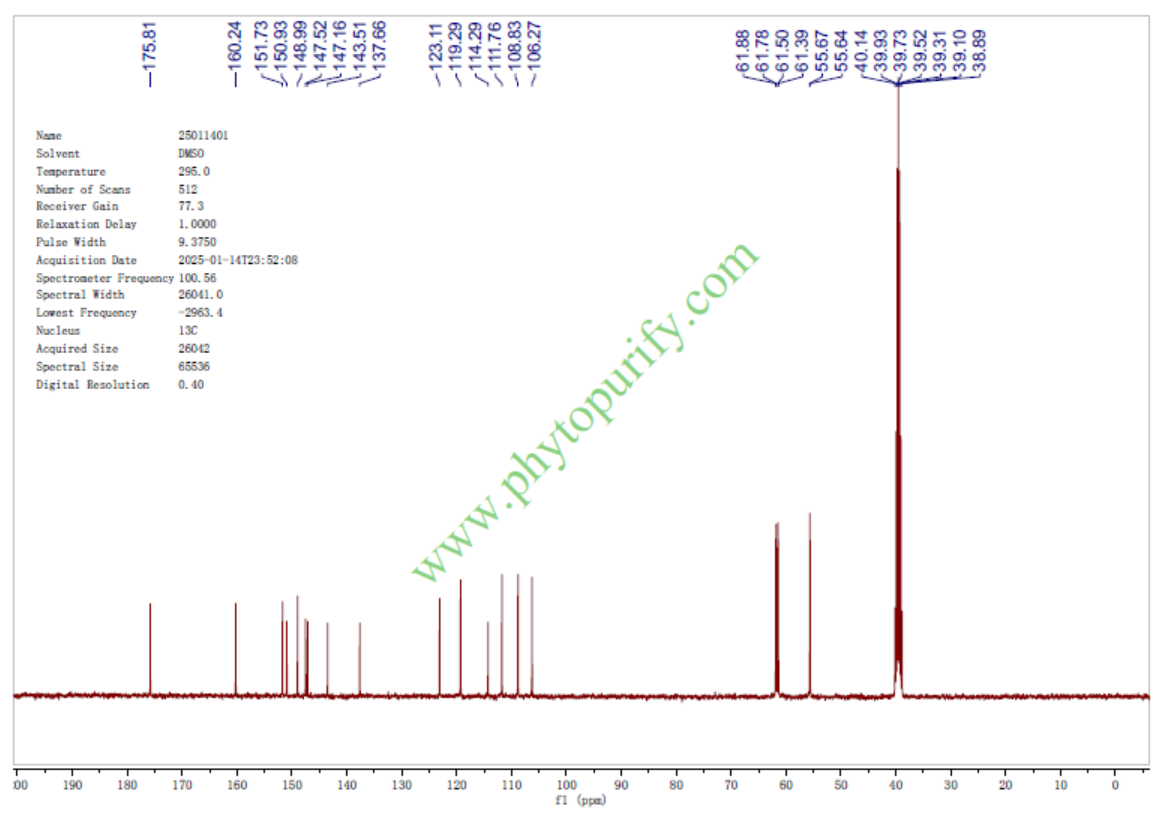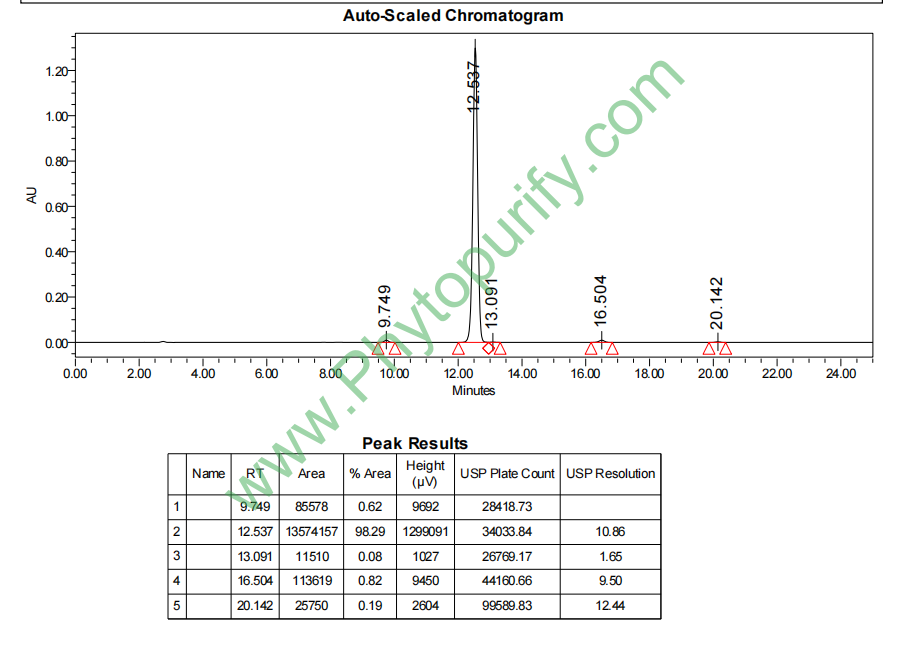
NobiletinCAS No.:478-01-3
|
||||||||||
 |
|
|
||||||||

| Catalogue No.: | BP1001 |
| Formula: | C21H22O8 |
| Mol Weight: | 402.399 |
Product name: Nobiletin
Synonym name: 3'4'5,6,7,8-Hexamethoxyflavone
Catalogue No.: BP1001
Cas No.: 478-01-3
Formula: C21H22O8
Mol Weight: 402.399
Botanical Source: Citrus reticulata Blanco
Physical Description:
Type of Compound: Flavonoids
Purity: 95%~99%
Analysis Method: HPLC-DAD or/and HPLC-ELSD
Identification Method: Mass, NMR
Packing: Brown vial or HDPE plastic bottle
Storage: Store in a well closed container, protected from air and light. Put into refrigerate or freeze for long term storage.
Whenever possible, you should prepare and use solutions on the same day. However, if you need to make up stock solutions in advance, we recommend that you store the solution as aliquots in tightly sealed vials at -20℃. Generally, these will be useable for up to two weeks.
The product could be supplied from milligrams to grams
Inquire for bulk scale.
Description:
Nobiletin, a citrus flavonoid isolated from citrus peels like in tangerine, which has anti-inflammatory and anti-tumor activities, it could be a potential protective agent for the prevention and treatment of restenosis after angioplasty. Nobiletin downregulated the expression of inducible nitric oxide synthase (iNOS) and cyclooxygenase 2 (COX-2), suppressed cell viability through AKT pathways.
References:
Tumour Biol. 2014 Dec;35(12):11903-11.
Nobiletin suppresses the proliferation and induces apoptosis involving MAPKs and caspase-8/-9/-3 signals in human acute myeloid leukemia cells.
Nobiletin, a compound isolated from citrus fruits, is a polymethoxylated flavone derivative that was shown to have anti-inflammatory and anticancer activities in various solid tumors. The anticancer effect of Nobiletin on nonsolid tumor remains unclear.
METHODS AND RESULTS:
Herein, the molecular mechanisms by which Nobiletin exerts its anticancer effects on acute myeloid leukemia (AML) cells were investigated. The results showed that Nobiletin suppressed cell proliferation in various types of AML cell lines. Moreover, Nobiletin induced cell-cycle arrest of HL-60 AML cells at the G0/G1 phase by suppressing extracellular signal-regulated kinase (ERK) activity. Furthermore, Nobiletin effectively induced apoptosis of HL-60 cells through caspase-8, caspase-9, and caspases-3 activation concomitantly with a marked induction of p38 mitogen-activated protein kinase (MAPK) activation, but without affecting expression levels of Bcl-2, Bax, or Bid.
CONCLUSIONS:
Taken together, our results suggest that Nobiletin inhibited HL-60 cell proliferation through inducing cell-cycle arrest and apoptosis and could serve as a potential additional chemotherapeutic agent for treating AML.
Expert Opin Ther Targets. 2015 Mar;19(3):307-20.
Nobiletin inhibits invasion and migration of human nasopharyngeal carcinoma cell lines by involving ERK1/2 and transcriptional inhibition of MMP-2.
Nasopharyngeal carcinoma (NPC) is known for its high incidence of neck lymph node metastasis, which represents poor prognosis. Nobiletin is a citrus polymethoxyflavonoid that suppresses tumor growth and metastasis, both of which depend on angiogenesis in previous studies. However, the effect of Nobiletin on human NPC cells metastasis has not been clearly clarified.
METHODS AND RESULTS:
In this study, we determine the effects of Nobiletin on the migration and invasion in NPC cells. Nobiletin significantly inhibited migration/invasion capacities of HONE-1 and NPC-BM cell lines. The results of gelatin zymography and western blotting revealed that the activities and protein levels of the MMP-2 were inhibited by Nobiletin. Nobiletin also showed that inhibits phosphorylation of ERK1/2. Tests of the real-time PCR and promoter assays evaluated the inhibitory effects of Nobiletin on MMP-2 expression in human NPC cells. Nobiletin inhibits MMP-2 expression, up-regulating tissue inhibitor of metalloproteinase-2 and down-regulation of the transcription factors of NF-κB and activator protein 1 (AP-1) signaling pathways. Finally, an administration of Nobiletin effectively suppressed the tumor formation and metastasis in the NPC xenograft model in vivo.
CONCLUSIONS:
Nobiletin may have potential use as a chemo-preventive agent against nasopharyngeal cancer metastasis.
Biochem Pharmacol. 2003 Jun 15;65(12):2065-71.
Novel anti-inflammatory actions of nobiletin, a citrus polymethoxy flavonoid, on human synovial fibroblasts and mouse macrophages.
We previously reported that Nobiletin (5,6,7,8,3',4'-hexamethoxy flavone), a citrus polymethoxy flavonoid, effectively interferes with the production of promatrix metalloproteinase (proMMP)-9/progelatinase B in rabbit synovial fibroblasts [J. Rheumatol. 27 (2000) 20].
METHODS AND RESULTS:
In this paper, we further examine the effects of Nobiletin on the production of cyclooxygenases (COXs), prostaglandin (PG) E(2), and proinflammatory cytokines in human synovial fibroblasts and the mouse macrophage J774A.1 cell line. Nobiletin suppressed the interleukin (IL)-1-induced production of PGE(2) in human synovial cells in a dose-dependent manner (<64 microM). Additionally, it selectively downregulated COX-2, but not COX-1 mRNA expression. Nobiletin also interfered with the lipopolysaccharide-induced production of PGE(2) and the gene expression of proinflammatory cytokines including IL-1alpha, IL-1beta, TNF-alpha and IL-6 in mouse J774A.1 macrophages. In addition, Nobiletin downregulated the IL-1-induced gene expression and production of proMMP-1/procollagenase-1 and proMMP-3/prostromelysin-1 in human synovial fibroblasts.
CONCLUSIONS:
In contrast, production of the endogenous MMP inhibitor, TIMP-1, was augmented by Nobiletin. These anti-inflammatory actions of Nobiletin are very similar to those of anti-inflammatory steroids such as dexamethasone, and the upregulation of TIMP-1 production is a unique action of Nobiletin. Therefore, these results further support the notion that Nobiletin is likely to be a candidate for characterization as a novel immunomodulatory and anti-inflammatory drug.
Mol Nutr Food Res. 2015 May;59(5):829-42.
Citrus nobiletin ameliorates experimental colitis by reducing inflammation and restoring impaired intestinal barrier function.
Inflammatory bowel disease is a chronic inflammatory disorder of the gastrointestinal tract. Citrus Nobiletin can exert robust anti-inflammatory effects in vivo and in vitro. We evaluated the impact of Nobiletin on the excessive inflammatory response and impaired barrier function in a rodent colitis model.
METHODS AND RESULTS:
Colitis was established by infusion with 1 mL 2,4,6-trinitrobenzene sulfonic acid (TNBS) dissolved in ethanol (40% v/v) in rats at a 125 mg/kg dose. Caco-2 cell monolayer exposed to LPSs is used as a culture model for intestinal permeability measurements. Nobiletin decreased rat epithelial proinflammatory cytokines and mediators production. Nobiletin restored impaired barrier function in colitic rats and Caco-2 monolayer. Nobiletin decreased protein expressions of Akt, nuclear factor-kappa B (NF-κB), and myosin light chain kinase (MLCK) isolated from rat intestinal epithelial tissue and Caco-2 cell, respectively. PI3K inhibitor or siRNA targeting of either Akt or NF-κB mitigated the impact of Nobiletin on MLCK expression and barrier function in Caco-2 monolayer, respectively.
CONCLUSIONS:
Nobiletin exerted anti-inflammatory effects in TNBS-induced colitis through the downregulation of inducible nitric oxide synthase (iNOS) and cyclooxygenase 2 (COX-2) expression. Nobiletinrestored barrier function, which had been damaged after TNBS administration, through the inhibition of the Akt-NF-κB-MLCK pathway.
NMR of Nobiletin

HPLC of Nobiletin
